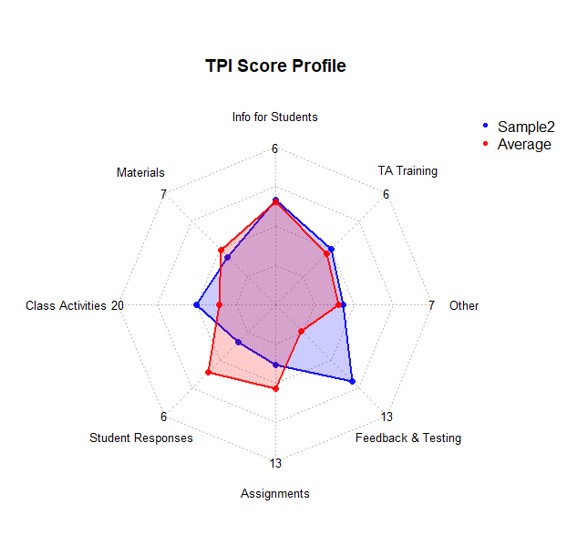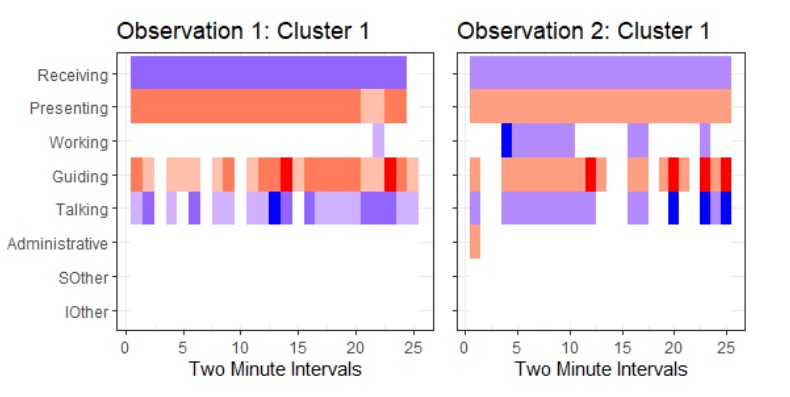What is POCA?
The Peer Observation of Classroom Activities (POCA) program is a network of faculty observing each other's teaching. Peer-observation programs can document the types of teaching practices on instructor and departmental levels, support professional development opportunities, and evaluate the effects of instructional interventions with pre and post observations. This program helps participants by conducting observations and providing an objective source of formative feedback.
While in the POCA program, participants take on two different roles: observer and instructor. Both observing and being the instructor who is observed are beneficial processes. When observing other instructors, you have the opportunity to see how others conduct their classes and to experience a class from the students' point of view. When being observed, you will likely think about your teaching practices in different ways than you typically do, especially by considering the student or observers perspective of the classroom experience.
To register please follow: https://engineering.unl.edu/ecec/registration/.
POCA Timeline
| Activity / Deadline | Timing | Dates for Spring 2024 | Dates for Fall 2024 |
| First announcement about the program / sign-up opens | Approximately one month before the end of the prior semester | Late November | Late April |
| Associate Dean for Faculty and Inclusion notifies faculty who MUST go through the program | Approximately three weeks before the end of the prior semester | Late November / Early December | Late April / Early May |
| Second announcement via COE Update | Approximately two weeks before the end of the prior semester | December | Mid-May |
| Registration deadline | One week before the start of the semester | January 15 @ 5:00 PM | August 15 @ 5:00 PM |
| COPUS Trainings | Multiple, in the two weeks before the start of the semester (participants only need to attend one) | January 8 – 19 | August 12 – August 23 |
| Deadline for providing course details and observation availability | Friday of the first week of classes | January 26 | August 30 |
| Sign up to do three observations | Week 2 – week 3 | January 29 – February 16 | September 2 – September 13 |
| Observations conducted | Week 3 – week 11 | February 5 – April 12 | September 9 – November 8 |
| Deadline for completing Teaching Practices Inventory | End of week 12 | April 19 | November 15 |
| Personalized reports sent to participants | End of week 14 | May 3 | December 6 |
Key Contacts
For questions about program design, development, implementation, and logistics, please contact Dr. Tareq Daher or Dr. Markeya Peteranetz.
Participant Responsibilities
As an Observer You Will:
- attend a 90-minute training on using COPUS at least once. Training must be completed prior to conducting in-class observations
- sign-up for at least three observations using the designated sign-up sheet
- complete at least three 50-minute observations instructors during the semester - if you do not arrive for an observation on time, it does not count towards your required 3 observations
- turn in completed COPUS forms on Canvas by the deadline
As an Instructor You Will:
- provide information about your course and dates when you can be observed (this is part of the registration form)
- complete the Teaching Practices Inventory (online) once during the semester
- participate in a 30-minute one-on-one consultation
Benefits
As an observer, you will have the opportunity to see how others in the College of Engineering teach and consider how what you observe might inform or expand your own teaching practices. Our post-observation reflections (word or pdf) can be used to guide a structured reflection on what you observe.
As an instructor, after you are observed by COPUS-trained observers and complete the TPI receive you will a personalized report of the COPUS and TPI data. You and the Director of the ECEC will review the personalized report in a one-on-one consultation where you will discuss recommendations for future teaching and available workshops or professional development programs that might be of interest to you. Following the one-on-one consultation, you are encouraged to engage in structured reflection on your instructional data using our reflection packet (word or pdf), which contains reflections for both the single-semester reports and the multi-semester reports.
The personalized report contains visualizations of your data and descriptive information about how your data compare to the data of other participants from the College of Engineering. A sample single-semester report is available here and a sample multi-semester report is available here.



Resources
- Information about COPUS
- COPUS Codes Shortcut
- ECEC-style COPUS observation form (.xlsx download)
- Journal Article about the TPI
- ECEC Contacts: Dr. Tareq Daher and Dr. Markeya Peteranetz
Frequently Asked Questions
Q: How do I become part of the POCA program? A: Sign up using this form prior to the registration deadline listed in the calendar above.
Q: I was in POCA a while ago. Do I have to redo the COPUS training? A: It is recommended that everyone gets trained every semester they participate. Once an instructor completes the training, training is good for 3 semesters (e.g., Fall, Spring, Fall). After 3 semesters, you must go through retraining regardless of how many observations conducted since your previous training.
Q: I signed up for an observation that I can no longer attend. What should I do? A: Email Markeya Peteranetz ASAP.
Q: When should I arrive for my observation? A: We recommend that you arrive at least 5 minutes before the start of the class to give the instructor the opportunity to see that you are there to observe. Some instructors may elect to announce your presence to the students while other might begin teaching without saying anything about why you are in the class. We recommend you sit toward the back of the classroom and do your best to be unintrusive so that the instructor can choose whether they would like to mention your attendance to students.
Q: I was late to my observation. What should I do? A: Email Markeya Peteranetz ASAP.
Q: One of the dates I gave to be observed will no longer work for me. What should I do? A: Email Markeya Peteranetz ASAP.
Q: How do I submit my COPUS forms? A: After you sign up for observations, you will be added to calendar invitations for your observations. A COPUS form will be attached to each invite. Simply complete the form attached to your invite, and it will be automatically shared with the program administrator (Markeya Peteranetz).
Q: How do I know when I will be observed? A: Check your Outlook calendar. The observation event invites should include both the person being observed and the observer. You can also check the sign-up sheet where you originally signed up for observations or email Markeya Peteranetz. It is best to assume that you will be observed on any date you provided as a possibility.
Q: I gave six observation dates. Why are there only 4 on the sign-up sheet? A: The first four dates are used as primary dates for observations. The last two dates are held in reserve in case there is a need to reschedule or add observations.
Q: When will I receive my report? A: Before the end of the semester (see the calendar above).